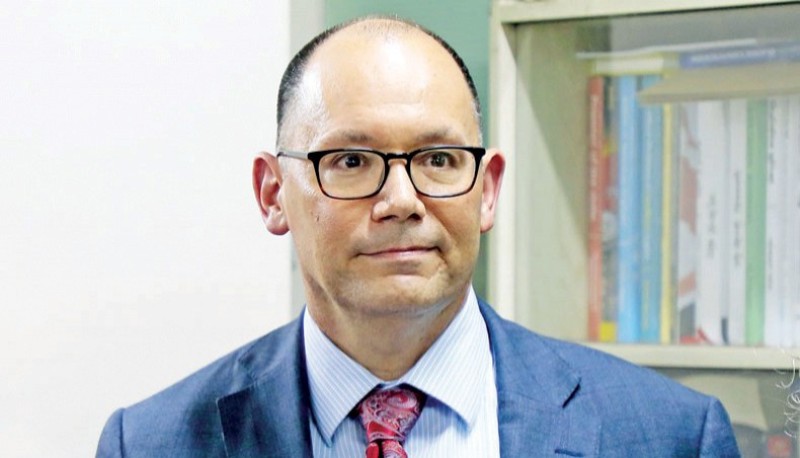After leaving Dhaka in July 2024 and subsequently quitting the US Foreign Service and the State Department in September the same year, the then American ambassador to Bangladesh, Peter Haas, entered and exited the host country on at least five to six occasions.
These visits were explained away as business trips on behalf of his new employer, Excelerate Energy, as a Strategic Adviser. Excelerate Energy, a Texas-based company that is listed on the New York Stock Exchange, claims it is a “global leader in FSRUs (Floating Storage and Regasification Units) and downstream LNG infrastructure. Our aim is to leverage our unrivaled experience to help customers across the globe unlock access to abundant LNG supply”.
However, after Haas joined Excelerate Energy, the company’s President and CEO described the former ambassador as someone who “understands the intersection of geopolitics and markets”. Excelerate has offices in Abu Dhabi, Antwerp, Boston, Buenos Aires, Chattogram, Dhaka, Doha, Dubai, Helsinki, London, Manila, Rio de Janeiro, Singapore, and Washington, DC.
While Dhaka-based security officials Northeast News spoke with were reluctant to share the precise dates on which Haas entered and exited Bangladesh over the past one year, he did meet Chief Adviser Mohammad Yunus and other advisers in the interim government. Haas last met Yunus at the Jamuna guest house on April 8 this year.
Haas played a clandestine role between mid-2023 and July 2024 when he quietly left the Bangladeshi capital. He was instrumental in leading the call for “free and fair elections” in Bangladesh when Sheikh Hasina was in power and collaborated with the then US Assistant Secretary of State for South and Central Asia, Donald Lu.
Between October and November 2023, Haas made two secretive visits to Sri Lanka and Mumbai, ostensibly on “leave”, but his mission was to meet American security and intelligence officials who were instrumental in guiding and coaching the student leaders who subsequently led the mass movement, which ousted Sheikh Hasina from power.
Haas, Bangladeshi security officials said, landed in Dhaka on August 3. On Tuesday (August 5), he met five NCP leaders – Hasnat Abdullah, Sarjis Alam, Tasnim Zara, Nasiruddin Patwary and Khaled Saifullah – who were also part of the Anti-Discrimination Students Movement, at Cox’s Bazar’s Royal Tulip Hotel (which is also known as Sea Pearl Bech Resort). The five NCP leaders flew to Cox’s Bazar early on Tuesday in a Bangladesh Biman flight before their meeting with Haas.
Last year, once the Yunus-led interim regime took charge on August 8, information about the clandestine meetings that some of the student leaders had with American embassy officials, including Haas, began to come to light. American officials, suspected to be intelligence officers using USAID cover, met some of the student leaders in Doha and Dubai, while Pakistani senior ISI officers also met batches of students in cities in their country. In both cases, most of the meetings took place between April and September 2023.
Haas, Bangladesh security officials said, would meet Dhaka University Law department Professor Asif Nazrul “well past midnight” in secret locations in Dhaka.
The American intelligence officials who were part of the “regime change” operation that began as early as the winter of 2022 were based out of Doha. The regime mission had three distinct components and phases. The first phase began in early March 2023 when Yunus stepped down as Chairman of the Grameen Group – on March 7, 2023, three co-chairpersons were appointed – and soon thereafter, Haas became vocal about “free and fair elections”. Yunus stepped down at that time on the advice of his American handlers.
This phase continued till November 2023, when a meeting was convened in Washington DC. This meeting was helmed by former ambassador to Bangladesh, William Milam, who at that time was a Senior Policy Scholar at the Woodrow Wilson International Center for Scholars in Washington, DC. Several other influential Bangladeshis were part of this meeting, which decided that there would be no further calls for “free and fair” elections.
The American embassy and US State Department officials stuck to this strategy till well beyond the disputed January 7, 2024, elections. The second phase of the regime change operation began and unfolded in July-August 2024. It was marked with widespread and deadly violence that forced Sheikh Hasina to flee to India.
ALSO READ: Khalilur and US Undersecretary of State Allison Hooker to discuss Bangladesh-US defence cooperation
The third phase began after the Yunus-led interim took charge. This phase was marked by US moves to use the Bangladesh Army as a proxy for engaging with the Arakan Army in Myanmar’s Rakhine State, which was part of the grant design that forms the basis of the Burma Act.















